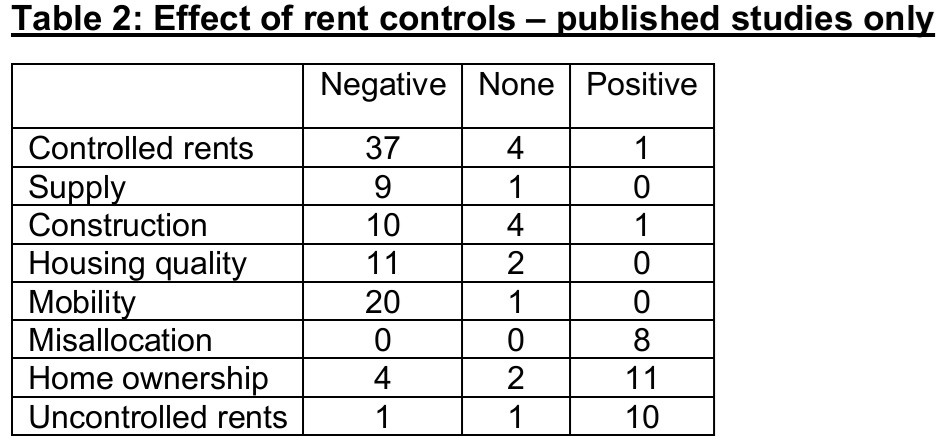I periodically explain that the world is a laboratory, filled with experiments that teach (or should teach) that we get more prosperity with free markets and limited government.
Today, let’s look at the global laboratory and see what it teaches us about rent control.
But before examining two case studies, I want to share this table from a recent study by the London-based Institute for Economic Affairs. The inescapable conclusion from peer-reviewed research is that rent control has very bad consequences.
Now let’s look at two new case studies.
We’ll start in the Netherlands. In a report for Bloomberg,
Cagan Koc and Sarah Jacob explain that the expansion of rent control by
the Dutch government is having predictably negative effects.
Moraal is among the growing number of Dutch people struggling to find a rental property after a new law designed to make homes more affordable ended up aggravating a housing shortage. Aiming to protect low-income tenants, the government in July imposed rent controls on thousands of homes, introducing a system of rating properties based on factors such as condition, size and energy efficiency.
The Affordable Rent Act introduced rent controls on 300,000 units… The Netherlands has the highest proportion of rent-controlled homes in Europe… Before the new law came into effect, four-fifths of the country’s 3 million rental properties were subject to controls, and the law raised that to 96%, according to the housing ministry. …
To keep up with population growth, the Netherlands needs about 100,000 new dwellings a year, but over the past decade it’s built an average of two-thirds that many. …middle-income tenants will be hardest hit by the law, says Jasper de Groot, CEO of property listings website Pararius.
Now let’s go across the Atlantic Ocean and into the Southern Hemisphere to learn about what happened when the libertarian president of Argentina, Javier Milei, eliminated rent controls.
Once again, we got predictable results. But unlike the Netherlands, the results in Argentina were wonderfully positive.
Jesus Mesa explains in a column for Newsweek. Here are some excerpts.
Argentina’s recent repeal of rent control by libertarian President Javier Milei has led to a surge in housing supply, with the freedom to negotiate contracts, previously restricted, directly causing a drop in rental prices.
Milei, a self-described “anarcho-capitalist” known for his free-market approach, repealed the 2020 Rental Law, enacted by former leftist President Alberto Fernández, which had imposed restrictions on landlords and led to a significant decline in rental availability. …
The law, introduced in 2020, ended up distorting the real estate market and hurting both landlords and tenants. …by the end of last year, an estimated one in seven homes in Buenos Aires was sitting empty as landlords chose not to rent them out in Argentine pesos. …
But after the repeal, Buenos Aires saw a doubling of available rental units, and rental prices have stabilized. Under the new rules, landlords and tenants have more freedom to agree on lease terms. …Since Millei’s repeal of rent control laws took effect on December 29, the supply of rental housing in Buenos Aires has jumped by 195.23%, according to the Statistical Observatory of the Real Estate Market of the Real Estate College.
I don’t know whether to call this an IQ test or a reading comprehension test, but anyone who thinks the Netherlands approach is better gets a failing grade.
In which case I encourage them to read about the effect of rent control in New York, Berlin, San Francisco, Stockholm, and St. Paul.
And if those don’t convince you either, please don’t impose your ignorance on the rest of us by voting.

No comments:
Post a Comment